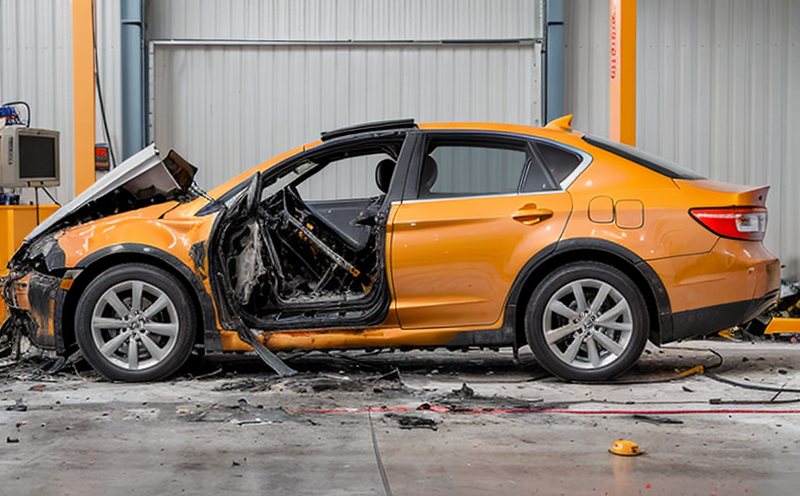SAE J2289 Mechanical Abuse Testing of EV Battery Modules
The SAE J2289 standard is a critical component in ensuring the safety and performance of electric vehicle (EV) battery modules. This testing procedure aims to simulate real-world abuse conditions that may be encountered during transportation, use, or storage. Understanding these conditions allows manufacturers to design safer and more reliable EV batteries.
The SAE J2289 test method is designed to evaluate the structural integrity of battery cells, modules, and systems under various mechanical stresses. It covers a range of abuse cases such as drop tests, compression tests, and thermal shock tests. These tests help identify potential weaknesses in the design that could lead to safety hazards or performance issues.
During the test, each specimen undergoes multiple cycles of loading to simulate impacts from drops, collisions, and other mechanical stresses. The goal is to determine how well the battery can withstand these conditions without compromising its integrity or causing a failure that may result in a fire or explosion.
The testing process involves several key steps: sample preparation, test setup, application of loads, monitoring of responses, and evaluation of results. Sample preparation includes ensuring the specimen is representative of the intended product design. Test setup ensures all equipment aligns with the specified parameters outlined in SAE J2289.
The testing apparatus used for this procedure typically consists of drop towers, compression machines, and environmental chambers capable of simulating extreme temperature conditions. The use of these advanced tools allows for precise control over loading rates, temperatures, and durations.
After applying the specified loads, the specimen is inspected to assess any visible damage or changes in performance characteristics. Key parameters measured include internal resistance, voltage, current, and temperature rise. These metrics provide insights into how well the battery holds up under abusive conditions.
The results of these tests are crucial for both manufacturers and regulators. They help ensure that EV batteries meet stringent safety requirements set forth by international standards like SAE J2289. By adhering to these guidelines, manufacturers can enhance consumer confidence in their products while also complying with regulatory mandates.
| Standard | Description |
|---|---|
| SAE J2289 | Mechanical abuse testing for electric vehicle battery modules. |
| ISO 16750-3 | Environmental conditions and test procedures for road vehicles - Part 3: Electrical equipment at extreme temperatures. |
The SAE J2289 mechanical abuse testing is essential in the development process of EV batteries. It ensures that these critical components can withstand rigorous conditions without compromising safety or performance. This testing plays a vital role in safeguarding both consumers and the environment.
Applied Standards
| Standard | Description |
|---|---|
| SAE J2289 | Mechanical abuse testing for electric vehicle battery modules. |
| ISO 16750-3 | Environmental conditions and test procedures for road vehicles - Part 3: Electrical equipment at extreme temperatures. |
The SAE J2289 standard provides a comprehensive framework for conducting mechanical abuse testing on EV battery modules. It specifies the types of tests to be performed, including drop tests, compression tests, and thermal shock tests. These tests are designed to simulate real-world scenarios that could potentially cause damage or failure.
The ISO 16750-3 standard complements SAE J2289 by addressing environmental conditions such as extreme temperatures. This ensures that the battery modules not only survive mechanical abuse but also perform reliably under varying temperature extremes.
By adhering to these standards, manufacturers can produce safer and more reliable EV batteries. Compliance with international regulations enhances consumer trust and contributes to overall industry safety standards.
Customer Impact and Satisfaction
The implementation of SAE J2289 mechanical abuse testing significantly impacts customer satisfaction by ensuring the reliability and safety of EV battery modules. For quality managers, compliance officers, and R&D engineers responsible for product development, this service offers peace of mind knowing that their products have been rigorously tested to meet stringent industry standards.
Through detailed analysis of test results, customers gain valuable insights into potential areas for improvement within their designs. This information helps guide future iterations towards even higher levels of performance and safety.
The process also builds trust between manufacturers and end-users. Consumers are reassured when they know that the batteries have undergone thorough testing to ensure they can handle harsh environmental conditions without compromising functionality or safety.
In summary, SAE J2289 mechanical abuse testing not only enhances product quality but also fosters customer satisfaction by providing a robust foundation for safe and reliable EV battery modules.
International Acceptance and Recognition
The acceptance of SAE J2289 mechanical abuse testing within the industry is widespread, reflecting its importance in ensuring the safety and reliability of electric vehicle (EV) batteries. Many leading automotive manufacturers and suppliers consider compliance with this standard as a prerequisite for product certification.
Regulatory bodies around the world recognize the significance of SAE J2289 testing, further enhancing its credibility and global acceptance. By adhering to these standards, companies demonstrate their commitment to maintaining high safety standards across different markets.
The international recognition of this service contributes to increased market confidence among consumers who value safety above all else when purchasing EVs. This widespread adoption underscores the necessity for thorough mechanical abuse testing in the production process of EV batteries.





